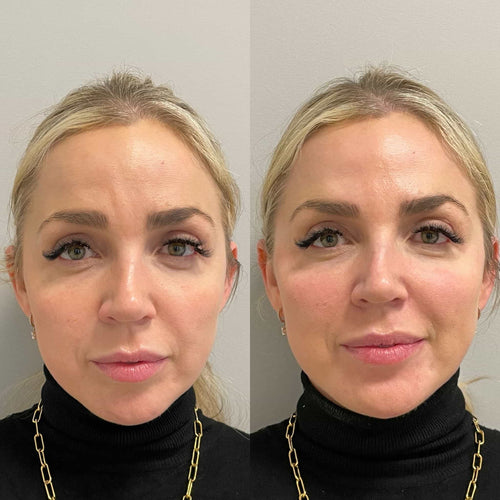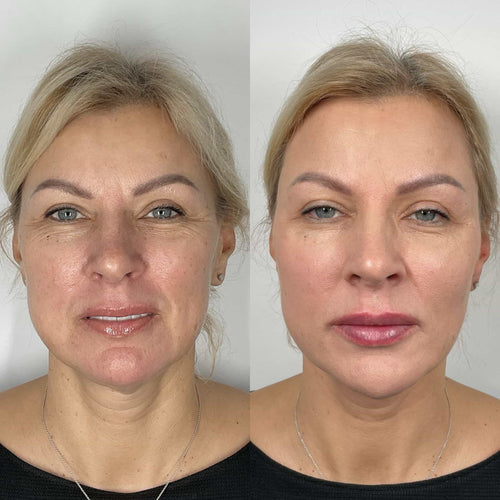Arrange Your Dermal Filler Session with Dr. Laura Geige
Pre-Procedure Preparation

Ice It Out
Pre-procedure preparation can significantly impact the swelling you experience after lip filler injections.
Here’s how to minimize those post-treatment puffy lips:
-
Avoid Alcohol & Blood Thinners:
Refrain from consuming alcohol for a few days prior to your appointment. Also, avoid taking blood thinners like aspirin or ibuprofen unless directed by your doctor. These substances can increase bleeding and bruising.
-
Hydrate Well:
Drink plenty of water in the days leading up to your treatment. Proper hydration helps keep tissues plump and reduces inflammation.
-
Eat a Healthy Meal:
Have a nourishing meal before your appointment. Low blood sugar can make you feel lightheaded during the procedure and may also contribute to swelling afterward.
**Ice It Out**
Applying ice is crucial for managing post-injection swelling. Here’s how to do it effectively:
-
Immediately After:
Apply a cold compress or ice pack wrapped in a towel to your lips for 15-20 minutes at a time, taking breaks as needed.
-
Throughout the First 24 Hours:
Continue icing your lips regularly for short intervals throughout the day. This helps constrict blood vessels and reduce inflammation.
Remember to be gentle with the ice, as excessive pressure can damage the skin.
Hydrate Smartly
Proper pre-procedure preparation can significantly influence swelling after lip filler injections. One crucial aspect is hydration.
In the days leading up to your appointment, aim for consistent and adequate water intake. Dehydration can make your body retain more fluid, potentially exacerbating swelling post-procedure.
Consider increasing your water consumption in the 24 hours prior to your appointment, but avoid excessive water intake right before the procedure. This could lead to bloating or discomfort during the injection process.
Alongside regular water, incorporating hydrating foods into your diet is beneficial. Fruits and vegetables with high water content, such as watermelon, cucumber, and spinach, can contribute to overall hydration.
Remember that everyone’s body reacts differently. Listen to your body and adjust your hydration strategy based on your individual needs.
If you have any concerns or specific questions about hydration before your lip filler appointment, consult with your injector.
Lifestyle Adjustments
Pre-procedure preparation plays a crucial role in minimizing post-treatment swelling from lip fillers.
Here’s what you can do beforehand:
-
Avoid Blood Thinners: Discontinue any blood-thinning medications, including aspirin, ibuprofen, and herbal supplements like ginkgo biloba, at least a week prior to your appointment. These medications can increase bleeding and bruising.
-
Limit Alcohol Intake: Reduce alcohol consumption in the days leading up to your procedure. Alcohol can also thin the blood and contribute to swelling.
-
Stay Hydrated: Drink plenty of water in the days before your appointment. Proper hydration helps reduce inflammation.
-
Eat a Healthy Meal: Have a nutritious meal a few hours before your procedure to maintain stable blood sugar levels, which can help minimize swelling.
Following these pre-procedure tips will help create an optimal environment for your treatment and reduce the likelihood of excessive swelling.
In addition to pre-procedure preparation, certain lifestyle adjustments after your lip filler appointment can further minimize swelling:
-
Ice It: Apply ice packs wrapped in a towel to your lips for 10-15 minutes at a time, several times a day. Ice helps constrict blood vessels and reduce inflammation.
-
Elevate Your Head: Sleep with your head slightly elevated using an extra pillow. This can help drain excess fluid.
-
Avoid Touching or Rubbing: Resist the urge to touch or rub your lips excessively, as this can irritate the area and worsen swelling.
-
Stay Hydrated and Avoid Smoking: Continue to drink plenty of water and avoid smoking, as they can hinder healing and increase inflammation.
By following these post-procedure guidelines, you can promote faster healing and reduce the duration of lip filler swelling.
Post-Procedure Care
Arnica for the Win
Get Your Dermal Filler Consultation with Dr. Laura Geige Today
Post-procedure care is crucial for minimizing swelling and ensuring optimal results after lip filler injections.
Following your injector’s instructions diligently is paramount. They will provide specific guidance tailored to your treatment.
Here are some general tips for post-procedure care:
-
Avoid touching or rubbing the treated area: Resist the urge to constantly touch your lips, as this can irritate them and promote swelling.
-
Stay hydrated: Drinking plenty of water helps flush out toxins and reduces inflammation.
-
Apply ice packs: Apply a cold compress for 10-15 minutes at a time, several times a day, to minimize swelling. Wrap the ice pack in a thin towel to protect your skin.
-
Elevate your head: Sleeping with your head slightly elevated can help reduce fluid buildup in your face.
-
Avoid strenuous activity: Refrain from intense exercise that raises your heart rate and blood flow, which can increase swelling.
-
Limit alcohol consumption: Alcohol is a vasodilator, meaning it widens blood vessels and can contribute to inflammation.
-
Take over-the-counter pain relievers: If you experience any discomfort, ibuprofen or acetaminophen can help manage pain and reduce swelling.
Arnica is a popular natural remedy that has shown some promise in reducing bruising and swelling.
You can find it in various forms, such as:
-
Topical creams or gels: Arnica creams can be applied directly to the treated area.
-
Oral supplements: Arnica tablets or capsules are taken by mouth.
It’s essential to discuss with your injector if arnica is safe for you and if it’s compatible with any medications you’re taking.
Massage Magic
Post-procedure care is crucial for optimizing results and minimizing downtime after lip filler injections.
In the immediate aftermath, you’ll likely experience some swelling, redness, and tenderness. This is a normal reaction to the procedure and should gradually subside within a few days.
Ice packs applied for 15-20 minutes at a time, several times a day, can help reduce swelling.
Avoid touching or rubbing your lips excessively, as this can irritate the treated area and prolong healing.
Keep hydrated by drinking plenty of water. This helps flush out toxins and supports overall healing.
For the first 24-48 hours, avoid strenuous exercise, alcohol consumption, and smoking. These activities can increase blood flow to the area, potentially exacerbating swelling and bruising.
When it comes to massage magic, gentle manipulation of the treated area can be beneficial after the initial 24 hours.
Light, circular motions with your fingertips can help distribute the filler evenly, reduce lumps, and promote lymphatic drainage. This aids in minimizing swelling and enhancing the final result.
However, remember to be extremely gentle. Avoid pressing too hard or using vigorous movements, as this could displace the filler or cause bruising.
Your practitioner can advise on the appropriate massage technique for your specific case.
Cool Compresses: Your Best Friend
After undergoing any procedure involving injections, such as lip fillers, it’s crucial to prioritize post-procedure care to minimize swelling and ensure optimal healing.
One of the most effective tools in your post-treatment arsenal is the humble cool compress.

Cool compresses work wonders by constricting blood vessels, thereby reducing inflammation and fluid buildup. This helps flatten swelling and bring down redness in the treated area.
Here’s how to make the most of cool compresses for post-lip filler swelling:
Frequency:** Apply a cool compress as frequently as possible, especially within the first 24-48 hours after your procedure. Aim for 10-15 minutes at a time.
**Application:** Wrap ice packs or frozen vegetables (peas or corn work well) in a thin towel to prevent direct contact with your skin, which can cause frostbite.
**Placement:** Gently apply the compress to the swollen area. Focus on the lips, avoiding excessive pressure that could massage the filler and worsen swelling.
**Additional Tips:**
– Stay hydrated by drinking plenty of water throughout the day to flush out excess fluids.
– Avoid strenuous activities, hot baths, or saunas, as these can increase blood flow and inflammation.
– Follow your doctor’s specific post-procedure instructions carefully. They may recommend additional measures to minimize swelling.
Troubleshooting Tips
Address Allergies Immediately
When it comes to lip filler swelling, quick action can make a huge difference in minimizing discomfort and achieving optimal results. If you notice signs of an allergic reaction after getting lip fillers, address it immediately.
Here’s what you should do:
1. **Identify the Symptoms:** Allergic reactions can manifest in various ways, from mild swelling and redness to itching, hives, or difficulty breathing. Be aware of any unusual symptoms that appear after your treatment.
2. **Remove the Allergen (If Possible):** If you suspect a specific ingredient in the filler is causing the reaction, gently try to remove it with a clean cloth or by gently massaging the area. However, avoid manipulating the injection site excessively as this can worsen swelling.
3. **Apply a Cold Compress:** Cold temperatures help constrict blood vessels and reduce inflammation. Wrap a cold pack or ice cube in a thin towel and apply it to the affected area for 10-15 minutes at a time, several times a day.
4. **Over-the-Counter Antihistamines:** Antihistamines like cetirizine (Zyrtec) or loratadine (Claritin) can help alleviate itching and swelling caused by allergic reactions.
5. **Oral Steroids:** Your doctor may prescribe oral steroids, such as prednisone, to quickly reduce inflammation if the reaction is severe.
6. **Seek Medical Attention Immediately:** If you experience difficulty breathing, wheezing, dizziness, or any signs of a serious allergic reaction (anaphylaxis), call emergency services immediately.
When to See a Doctor
Lip filler swelling is a common side effect that usually subsides within a few days to a week. However, if you’re experiencing excessive or persistent swelling, it’s important to know when to seek medical attention.
Here are some troubleshooting tips for reducing lip filler swelling:
-
Apply ice packs for 10-15 minutes at a time, several times a day. This helps constrict blood vessels and reduce inflammation.
-
Elevate your head while sleeping to minimize fluid buildup around your lips.
-
Stay hydrated by drinking plenty of water. This helps flush out toxins and promote healing.
-
Avoid strenuous activities, alcohol consumption, and smoking as these can increase swelling.
-
Use a gentle, fragrance-free cleanser to wash your face twice daily.
-
Avoid touching or picking at the treated area, as this can introduce bacteria and delay healing.
Arrange a Dermal Filler Session with Dr. Laura Geige Now
While these tips can often alleviate swelling, it’s crucial to consult a doctor if:
-
Swelling is excessive or doesn’t improve within 7 days.
-
You experience any signs of infection, such as redness, warmth, pain, or pus.
-
You have difficulty breathing or swallowing.
-
You notice any unusual lumps or changes in the shape of your lips.
Understanding Bruising
Bruising is a common side effect after lip filler injections. It happens when tiny blood vessels are damaged during the injection process.
While typically harmless and temporary, bruising can be concerning for some individuals. Fortunately, there are several tips to minimize bruising and speed up healing.
Immediately following your procedure, apply a cold compress to the treated area for 15-20 minutes at a time, several times a day. This helps constrict blood vessels, reducing swelling and discoloration.
Arnica cream or gel can also be beneficial in minimizing bruising. Apply it topically to the affected area as directed on the product label. Arnica is a natural anti-inflammatory agent that may help reduce blood pooling and promote healing.
Avoid touching or rubbing your lips excessively, as this can irritate the area and potentially worsen bruising.
Refrain from strenuous exercise for at least 24 hours after treatment. Physical activity can increase blood flow and potentially exacerbate bruising.
Maintain a healthy diet rich in fruits and vegetables to support overall healing and reduce inflammation.
Stay hydrated by drinking plenty of water, which helps flush toxins and aids in the body’s natural healing processes.
If you notice any signs of infection, such as redness, warmth, swelling, or pus, contact your doctor immediately.
It’s essential to follow all post-treatment instructions provided by your injector. They can offer personalized advice based on your specific needs and the type of filler used.
Press on Honey K Aesthetics Studio Tattoo Culture Magazine Making Memories London Kurious Kittens Pinnacle Wellbeing Media
- Why Gaslighting Is One Of The Most Toxic Behaviors In Relationships - November 13, 2025
- What Is The Downtime For Jaw And Chin Fillers? - November 10, 2025
- What Are The Best CBD Infused Gummies For Joint Pain - November 9, 2025
